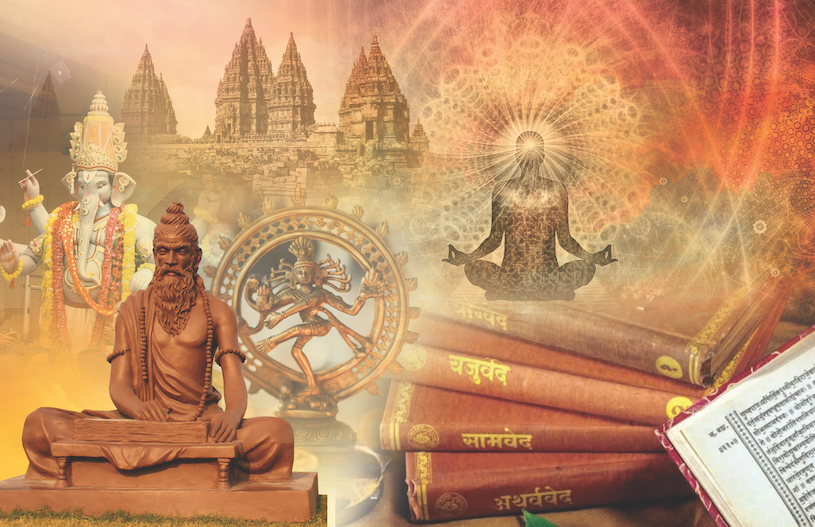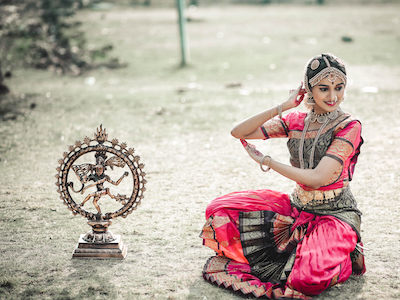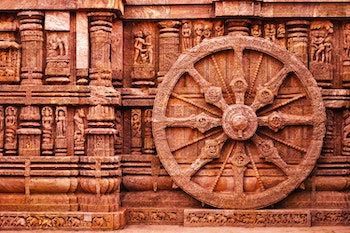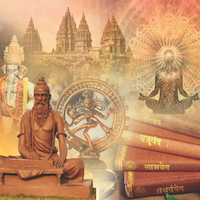Celebrating Hindu Heritage Month
Hinduism is not just about idol worship or the temples and scriptures. Hinduism has a rich and long heritage. It is a philosophy or a way of life that shows the light of humanity and how to attain the stage of detachment from earthly attachments. There is no founder of Hinduism. Rather, it is based on certain principles and beliefs that guide humankind even today. Hinduism embraces the worship of natural forces like air, fire, water, earth, and the universe – forces that later took the form of idols. There may be numerous rites and rituals of Hinduism, but all are united in a common belief; a common heritage that unites humankind with the ultimate bond of love and tolerance.

 Origin & History of Hinduism
Origin & History of Hinduism
Hinduism, the Sanatan Dharma (meaning ‘The Eternal Path’), has no specific date of origin. However, according to historians and scholars, the origin of Hinduism can be dated back to a period between 2300 B.C. and 1500 B.C. in the Indus Valley Civilization. It is believed that the religion is related to the migration of the Aryans to the Indus Valley around 1500 B.C. The synthesis of the Aryan culture and the native Dravidian culture is a major factor in the history of Hinduism. That is why Hinduism is regarded as one of the oldest religions in the world.
The Vedas, the Upanishads, the epics, and the rich Sanskrit scriptures depict the glorious traditions of Hinduism and its evolution through time. The historical background and the development of Hinduism have shown its basic values as being a thought process that elevates its followers to an elevated state of mind – a mind that is respectful and peaceful; a soul that is pure and composed.
Philosophy & Beliefs of Hinduism
Hinduism is more a philosophy than a religion. It stresses the importance of the Universal Creator or the Brahman and the presence of the Creator in the self or the Atman. Hindu philosophy also believes in the principles of Karma related to actions that can be good or bad. The cycle of Karma produces good or bad results according to the actions one takes. 
Hinduism believes in the power of love for, and devotion to, one and all. The concept of ‘Vasudhaiva kutumbakam’, meaning ‘The whole world is a family’, is the reflection of a profound belief in a single Creator for all of humanity, and pure love for embracing all of humankind as belonging to a single family. Despite the diversities embraced by Hinduism, there is a strong bond of unity that makes Hindu beliefs unique.
The philosophy and belief of Hinduism have intense faith and confidence in the power of universal peace. The Shanti mantra of ‘Sarvesham svastir bhavatu’ (May there be well-being for all) prays for the peace, prosperity, and well-being of all. Hindus believe in the presence of the Almighty in every living thing, including plants and animals. The ritual of Namaste, the practice of bowing with hands folded in prayer, is not just simply a gesture but rather represents the belief in the existence of divinity in everyone (even one’s enemies).
Hinduism’s Contributions to the World
Based on an insightful philosophy and integral studies, Hinduism has always been based on an eminently logical, cognitive foundation. That is the reason for the rich contribution of Hinduism to the world. Hindu researchers and learners have given the world some of the treasures that are beloved and appreciated even in this age of advanced science and technology.

Mathematics: The ancient Hindu mathematicians can truly be called geniuses, as they discovered many basic mathematical concepts. For instance, they were the first to discover the concept of zero, which became the symbol for nothingness – as well as becoming an additional identity in and of its own right. The concepts of trigonometry (including the value of pi) were born from the studies of Hindu scholars! Not only that, but the decimal and metric systems and quadratic equations were also the brainchildren of Hindu mathematicians.
Yoga and Meditation: The cardinal principles of fitness and well-being for today’s hectic and stressful lifestyle – the practices of yoga and meditation – were the results of the austere spiritual practices of the Hindu Yogis. What they practised as a means to cleanse the mind and keep the body resilient became the fitness mantra of generations through the ages. Meditation, or the practice of structured concentration, was part and parcel of yoga; it too became a powerful medium of physical and mental peace. People around the globe today have immense faith in the power of yoga and meditation for fighting against diseases both physical and psychological in nature.
The Sanskrit Language: The oldest organized language, Sanskrit, is another valuable contribution of Hinduism to the global circle of research and studies. This Indo-Aryan language created the earliest records of human civilization – records like the Vedas, the Upanishads, and epics such as the Ramayana and the Mahabharata. These were not merely religious texts or books of rituals. They reflect the time, socio-political conditions, and the life of the people in their vivid descriptions. Sanskrit is the classical language that proves the rich academic and literary genius of Hindu scholars who work with that language.
Ayurveda: Among many ‘firsts’, credit for the first holistic health treatment of the body and mind, the ‘Ayurveda’, goes to the Hindu scientists around 3000 years ago. The Charaka Samhita, a Sanskrit text on the details of Ayurvedic treatment, gives an account of the methods of treatment followed. Ayurveda largely depended on herbs for the cure of diseases; and emphasized the importance of the body’s natural immune system. The value of Ayurveda is time tested; and contemporary medical science ascribes a lot of value and importance to this branch of treatment. Millions of people today rely on the power of Ayurveda for treating even the severest of diseases.

Surgery: It is a great achievement of Hindu doctors that the first-ever-recorded surgery was performed by them as early as 600 BC. It was Sushruta, regarded as the Father of Surgery, who did the first-ever-recorded surgery in the world. The Sushruta Samhita contains detailed text about surgery.
Astronomy: The Hindu astronomers were trendsetters in various core concepts of astronomy like the solar system, the planets, and the rotation and revolution of the planets. Even the calculation of 365 days in a year was done by them based on the revolution of the Earth. The Shulba Sutras and the Vedanga Jyotisha are the earliest Sanskrit texts on astronomy, dating back to 500 A.D.
Hindu Festivals and their Messages
There are so many Hindu festivals that are celebrated around the year. Each festival is dedicated to a form of power or a deity, and celebrations are multifarious in nature. Diwali lights up the festive mood with lighted diyas, while in Dussehra the idol of Ravana – the demon king of the Ramayana epic – is burnt as a symbol of the defeat of evil and the prevalence of valour. Most of the Hindu festivals carry the message of the victory of right over wrong and good over evil forces. Hindu festivals are celebrated as a prayer to the different aspects of the Almighty. Ganesh Chaturthi is celebrated with prayers to Lord Ganesha who removes all hindrances and obstacles in life. Goddess Lakshmi is worshipped for wealth and prosperity, and Saraswati for knowledge and wisdom. Lord Rama shows the right path, Lord Krishna is the destroyer of evils, and Lord Shiva is the symbol of time and change. Navratri and Durga Puja celebrate the victory of Devi Durga, the goddess who comes to relieve misery.
Hindu festivals are celebrated with various rituals in different regions. But the essence of most of the festivals lies in the destruction of evil forces, and the triumph of virtue and of taking the right path.
Hindu Scriptures
The Hindu scriptures are rich philosophical teachings passed on from one generation to the next. There are two categories of Hindu scriptures: Shruti (meaning ‘heard’) and Smriti (meaning ‘remembering’ or ‘memorizing’).
The main Hindu scriptures falling in the category of Shruti are:
The Vedas: The literal meaning of ‘Veda’ is ‘knowledge’. It is the oldest Hindu scripture that dates back to the Indus Valley Civilization. It is believed that the Vedas were passed on by the Aryans. There are four parts of the Vedas, namely the Rig Veda, the Yajur Veda, the Sama Veda, and the Atharva Veda. They deal with religious practices and rituals along with worship and meditation.
The Upanishads: Based on the Vedic traditions, the Upanishads deal with self-realization and spirituality.
Hindu scriptures that are classified as Smriti include the Upavedas, the Vedangas, the Puranas, the Ramayana, the Mahabharata, the Bhagavad Gita, the Dharma Shastras, the Darshan Shastras, etc. Among these, the Ramayana and the Mahabharata are among the most famous epics of Hinduism. The Bhagavad Gita, a part of the Mahabharata, is highly regarded as a great philosophical teaching on the truth of life that was imparted by Lord Krishna to Arjuna. The Bhagavad Gita remains relevant to contemporary life and is quoted even today.
 Music, Art, and Dance in Hinduism
Music, Art, and Dance in Hinduism
Music and dance are an intrinsic part of Hinduism, not only as an art form but also as an expression of devotion and prayer to the Almighty. Hindu gods like Shiva and Krishna were dancers. Following this, dance became an important part of Hindu worship, where dance performances were dedicated to the deity. Dance forms like Bharatanatyam or Odissi or the folk dances of Garba or Raas are all dedicated to God.
Hindu tradition considers the creativity of dance forms as God’s blessings, and most of them are dedicated to God. Music forms like Bhajans or Kirtans are also devotional songs that depict the kindness and greatness of God. This is true about instrumental music too. Hindus sincerely believe that dance or music gives heavenly pleasure and brings them closer to God.
Hinduism has a profound effect on art and architecture. The wonderful paintings of the God and Goddesses, their divine expression of hope, blessings, and power coupled together are symbols of creative excellence. They create a marvellous feeling of joy and fulfilment. The architecture of Hindu temples, their outstanding designs with intricate artwork, are nothing but artistic genius. Apart from devotion, it creates a feeling of appreciation that transcends any religious belief.
Hindu sculpture has some characteristic features of holy symbols. It includes the Om, an appeal to the divine consciousness; the swastika, a symbol of good fortune; and the lotus flower, which symbolizes beauty, prosperity, and purity.
An attractive aspect of Hinduism is its assimilation of various teachings, forms of prayers, and values and principles. It may be termed as a religion, but it does not preach; neither does it impose any restrictions or create the threat of punishment. All it teaches is to accept everyone with open hands and pray for the welfare of humankind as a whole. Hinduism may have different paths or traditions in different parts of the country or continent, but the basic values remain the same. It is these values of united humanity and human characteristics that make Hinduism a part of life, a life that is above the mean and isolated world of selfishness and cruelty. Hinduism teaches tolerance and forgiveness, and its practice brings a divine feeling of peace and tranquillity.
“We owe a lot to the Indians, who taught us how to count, without which no worthwhile scientific discovery could have been made.”
-Albert Einstein
Idol Worship
Temples and scriptures
Hinduism has a rich and long heritage
philosophy
light of humanity
detachment from earthly attachments
detachment from earthly attachments
worship of natural forces like air
fire
water
earth and the universe
bond of love and tolerance
Sanatan Dharma
Eternal Path
Indus Valley Civilization
why Hinduism is regarded as one of the oldest religions in the world
The Vedas
Upanishads
Epics
rich Sanskrit scriptures
Hindu Philosophy
cycle of Karma produces good or bad results according to the actions
Vasudhaiva Kutumbakam
The whole World is a Family
Sarvesham Svastir Bhavat
Mathematics
Yoga and Meditation
Sanskrit Language
Ayurveda
Astronomy
Hindu Scriptures
Rog Veda
Yajur Veda
Sama Veda and Atharva Vedam
Music
Art and Dance in Hinduism
Bharatnatyam or Oddisi































